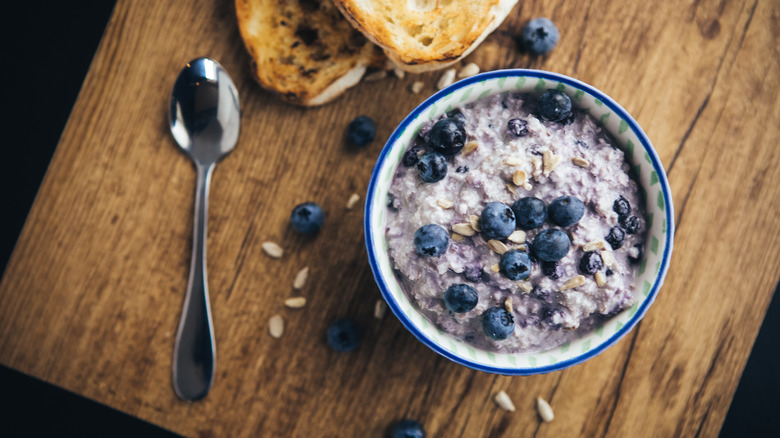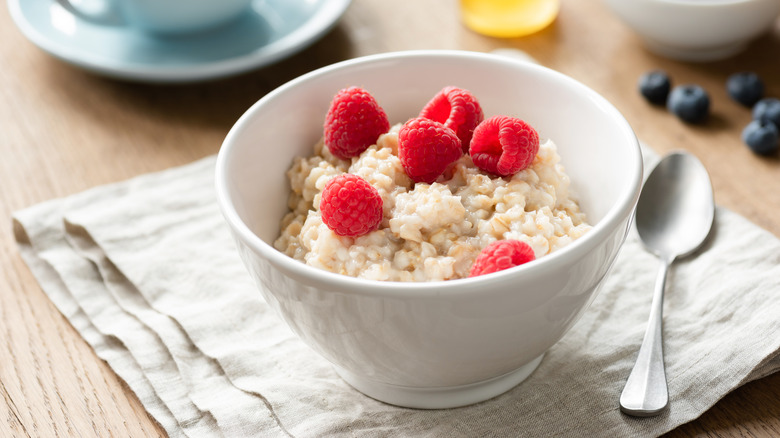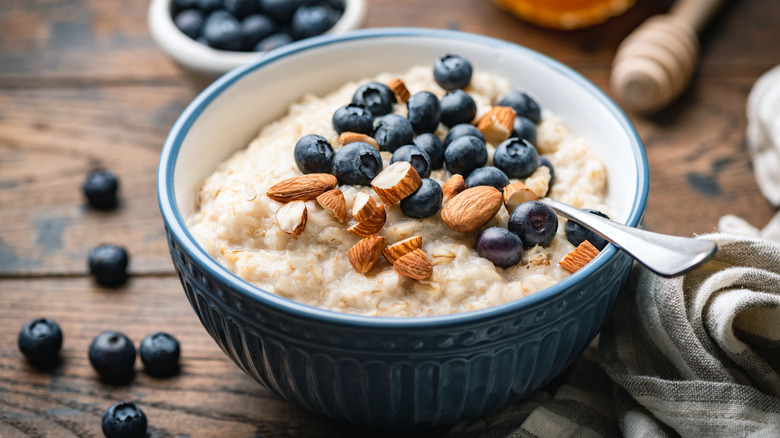Your Oatmeal Will Taste Heavenly With One Simple Swap
The true magic of a bowl of oatmeal lies in its endless possibilities. You can swap out almost every ingredient to suit your taste, except for the oats themselves. Don't like the sweetness of brown sugar? Try honey instead. Lactose intolerant and can't cook your oats with milk? Plain, boiled water in your oatmeal will work just fine. Toppings? Indulge in nuts, berries, or whatever your heart desires. But here's a swap that you've probably never considered: Replacing the water or milk with tea.
This trick may sound a bit unusual. After all, tea is not frequently cooked with other ingredients, though matcha can be used as pasta flavoring, and Earl Grey tea goes great in banana bread. But hear this out: By choosing the right tea — bonus points if it's a variety you already love -– your oatmeal can attain an entirely new dimension of flavor and fragrance. Imagine starting your day with a bowl of oatmeal infused with the warm, spicy notes of chai, or the bright, citrusy essence of a lemon or mango tea. The possibilities are endless!
The best teas to add to oatmeal
While plain black tea is an option, it might not be the most flavorful choice for your oatmeal. Loaded with tannins, it could make your mouth pucker from the bitterness. Plus, if you're watching your caffeine intake, the dosage you'd get with your black tea-cooked oatmeal may not be, well, your cup of tea. If you do want to use black tea, consider steeping it for a shorter time period than usual and opt for scented varieties, such as Earl Grey (bergamot) and Lady Grey (bergamot plus orange and lemon zest). When combined with fresh fruit slices, you'll have a balanced, flavorful, and fragrant meal to start your day right. Another option with a black tea base is spiced chai, which can impart a warm, spicy flavor to your oatmeal while limiting the natural astringency of the brew and providing a moderate caffeine boost.
For those who prefer fruity flavors or want to avoid caffeine altogether, give citrus and other herbal fruit-based teas a try, like lemon and mango or berry teas. Don't overlook how many types of herbal teas are out there — they're naturally caffeine-free. Try chamomile for a lighter, more floral scent in your oatmeal. And on a cold day or when you have a sore throat, instead of sipping ginger tea on the side, simply add it to your oatmeal. The zesty spice should wake you right up.
Working tea into your oatmeal
Infusing your oatmeal with tea is surprisingly simple. All you need to do is brew a cup (or two) of your chosen tea as you normally would. Use 8 to 12 ounces of hot water for a standard sized tea bag and up to 16 ounces for a larger tea bag. Once the tea has steeped (usually about three to five minutes, depending on the type of tea — check for instructions on the packaging), discard the tea bag. Then, pour the brewed tea into a saucepan. With 8 ounces or one cup of tea, you can cook about ¼ cup of steel-cut oats. If you're using instant or rolled oats, the portion will be larger – about ½ cup for each cup of tea.
That's really all there is to it! Let the oats bloom in the tea as you normally would, and once they've reached your desired consistency, remove from heat and transfer to a bowl. Drizzle with honey and sprinkle your favorite toppings, and you're ready to indulge in a fragrant, flavorful bowl of oatmeal unlike any other.


